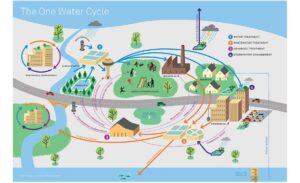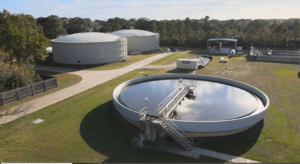The City of Houston, along with communities throughout the United States are actively preparing to combat the impacts of population growth and climate change on public water resources, and One Water is emerging as their primary strategy. Despite over two decades of development, the significance and objective of this catchphrase remain elusive, so we ask – what is One Water?
Formally, One Water is the name given to an approach that leaders and policy makers are using to plan and manage urban water sources with the goal of establishing long term resilience and reliability. One Water policies were established from the concept of Integrated Water Resource Management which emphasizes the sustainable management of water and related resources to maximize resultant environmental, economic, and social welfare in urban environments. This technique suggests all urban water sources – e.g. drinking water, wastewater, greywater, surface water, and ground water be integrated and managed collectively. Simply put, there is value in all water regardless of its end use and every drop counts.

A graphic in the Water Research Foundation’s “Blueprint for One Water” demonstrates how water systems can work together to create resiliency and meet community and ecosystem needs. Illustration courtesy Brown and Caldwell.
Traditionally, public water resources have been managed in siloed systems, each operated by different agencies without sufficient coordination. Moreover, conventional approaches to water management often prioritize immediate capital and maintenance costs, leading to standardized technological solutions and neglecting complexity. Under this infrastructure model, stakeholder engagement, including collaboration with the public, technical experts, and developers, is typically restricted and subject to the municipality’s discretion. However, given the advancements in technology and growing recognition of water as a finite and delicate resource, the continued reliance on disparate systems seems outdated, unsustainable, and economically unviable.
One Water aims to renovate the traditional practices by providing benefits and consideration to the community, economy, and environment at every level. This approach links together all sources of urban water and other areas of development through intentionally coordinated management. Embracing intuitive solutions and green infrastructure, One Water emphasizes water reuse within the watershed while safeguarding environmental conditions and essential utilities. Future considerations for water supply are made during urban planning, landscape architecture, and storm water conveyance efforts where water can be harvested and retained to support increased demand and environmental concerns. Wastewater and surface water are also treated as valuable sources to ease consumer demand through reclamation. These collective strategies aim to foster a closer connection between the public and their water supply. At the core of the initiative is stakeholder engagement and social welfare. One Water efforts intentionally incorporate public input, collaboration, and education. By prioritizing end users and ensuring their involvement at every stage of water planning and development, the initiative recognizes that everyone has a stake in their community’s water supply.

Cinco MUD 1 Water Treatment Plant
The integration of One Water into communities with well-established water infrastructure necessitates significant changes in governance structures, infrastructure standards, and municipal regulations. One example of moving towards this concept is Cinco MUD 1 water re-use system, which received all five stars from WHA’s Sustainability Stars program. Recognizing the uniqueness of water management strategies in each community and environment, One Water provides a framework and roadmap rather than strict policies and solutions to achieve overarching goals. While the implementation of these ideas will unfold over generations, the impacts are already being realized today as major cities nationwide have adopted One Water plans.
In October 2023, the City of Houston unveiled the first phase in their One Water Master Planning Project with a completion date set for July 2024.
This article is by Kendall Crawford, PE and other members of the WHA Water Resources Committee who work at
 2925 Briarpark Drive
2925 Briarpark Drive
Suite 400
Houston, Tx 77042
